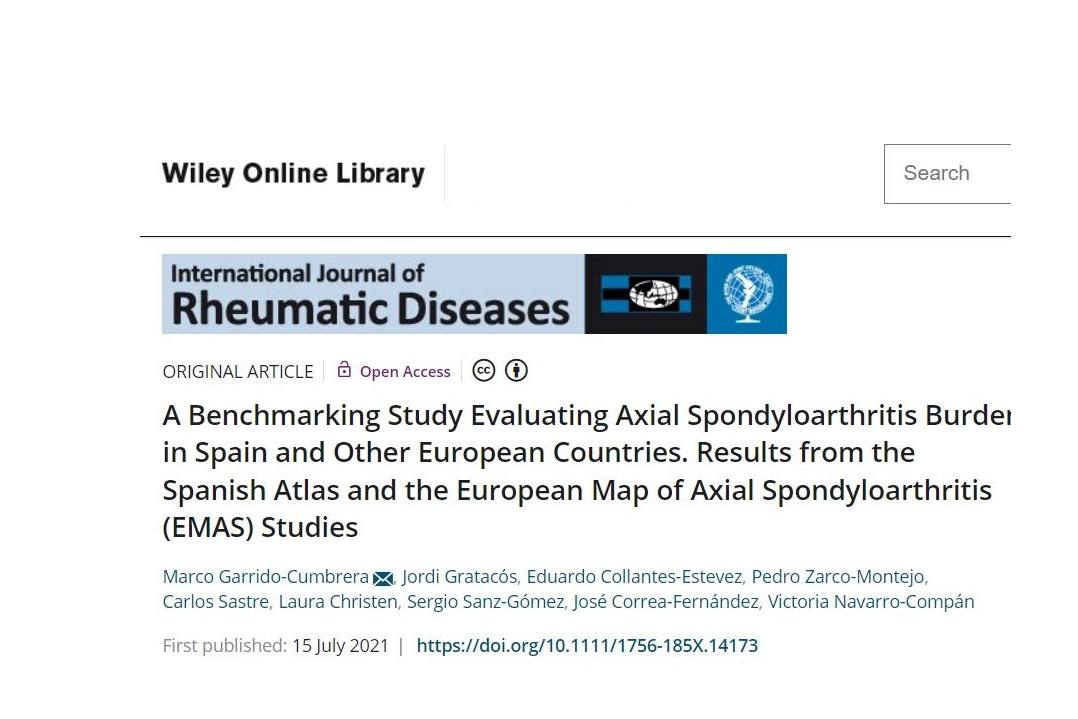A Benchmarking Study Evaluating Axial Spondyloarthritis Burden in Spain and Other European Countries. Results from the Spanish Atlas and the European Map of Axial Spondyloarthritis (EMAS) Studies
Marco Garrido-Cumbrera, Jordi Gratacós, Eduardo Collantes-Estevez, Pedro Zarco-Montejo, Carlos Sastre, Laura Christen, Sergio Sanz-Gómez, José Correa-Fernández, Victoria Navarro-Compán
Int J Rheum Dis. 2021
Objective
To compare the burden of disease in Spanish patients with axial spondyloarthritis (axSpA) vs other European countries (OEC).
Methods
Data from 2846 unselected patients from the European Map of Axial Spondyloarthritis (EMAS) and the Atlas of Axial Spondyloarthritis in Spain (Atlas) were collected through online surveys. Comparative analysis was carried out between Spanish patients (2016) and patients from 12 OEC (2017-2018). Socio-demographic characteristics, life habits, and patient-reported outcomes (Bath Ankylosing Spondylitis Disease Activity Index 0-10, spinal stiffness 3-12, functional limitation 0-54, the 12-Item General Health Questionnaire [GHQ-12] for psychological distress 0-12) were compared. Chi-square and Mann-Whitney tests were used for qualitative and quantitative variables respectively.
Results
680 (23.9%) Spanish axSpA patients were compared to 2166 axSpA patients (76.1%) from OEC. Compared to Spain, the OEC group had a higher percentage of females (64.1% vs 52.5%; P < .001) and university-educated participants (51.7% vs 36.9%; P < .001). Spanish patients showed a greater diagnostic delay (8.5 ± 7.7 vs 7.2 ± 8.6 years; P < .001), visits to orthopedic specialists before diagnosis (56.9% vs 25.3%; P < .001), human leukocyte antigen-B27 carriership (77.1% vs 70.1%; P = .003), disease activity (5.7 ± 2.0 vs 5.4 ± 2.0; P = .024), and higher unemployment rates (21.7% vs 9.2%; P < .001). Despite lower rates of diagnosed anxiety and depression, Spanish patients were at higher risk of psychological distress according to the GHQ-12 (5.7 ± 4.5 vs 4.8 ± 4.0; P < .001).
Conclusion
Compared to European axSpA patients, Spanish patients experience a longer diagnostic delay and greater psychological distress. Being wrongly referred to orthopedic specialists and facing a more precarious labor scenario appear as possible causal factors, highlighting the need to increase the number of rheumatologists, the training of healthcare professionals, and improving axSpA patients’ working conditions.
Enlace al artículo: https://onlinelibrary.wiley.com/doi/full/10.1111/1756-185X.14173








